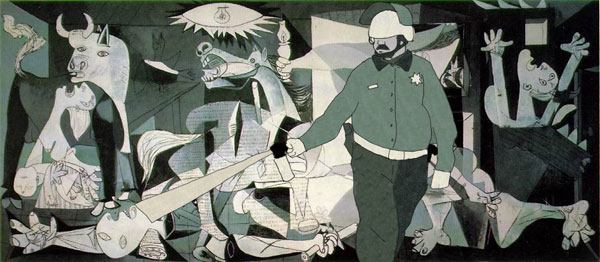It looks like you're using an Ad Blocker.
Please white-list or disable AboveTopSecret.com in your ad-blocking tool.
Thank you.
Some features of ATS will be disabled while you continue to use an ad-blocker.
share:
Are we witnessing the rise of a new form of self regulating social control?
In light of all the doom and gloom on ATS, I wanted to share this tidbit for a quick laugh and maybe witness the birth of a new trend.
Link-Uproxx
If you havent already read the story on this incident, there is a good existing thread if you are unfamiliar with this story.
Police Officer peppersprays nonviolent student protestors at UC Davis
As i stated in the title, this story has gone viral on the internet, resulting in an explosion of "lol-pics" or meme's.
The google trends on the keywords have gone through the roof, if you need proof!
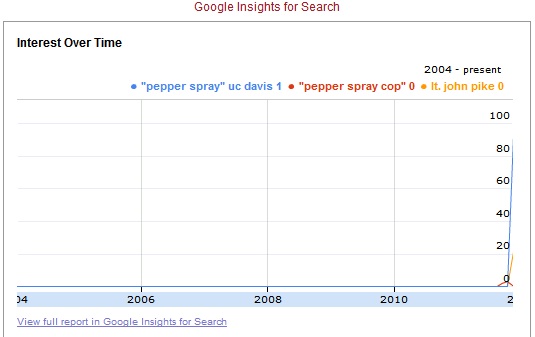
here are some of the funniest ones I found.
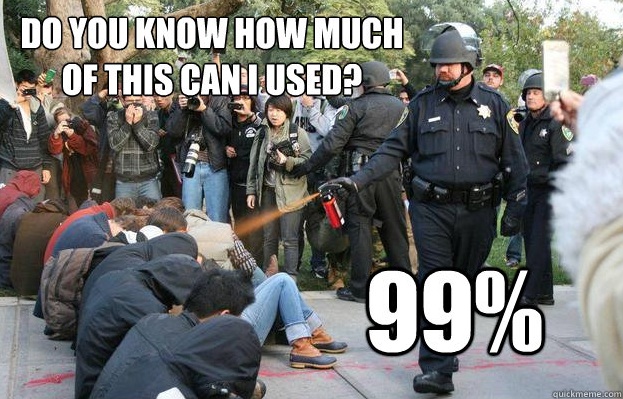

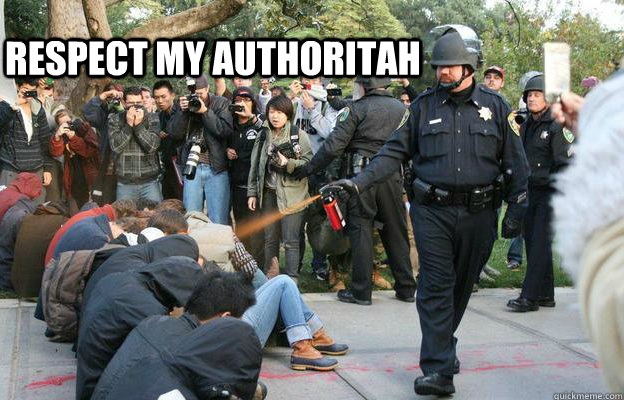
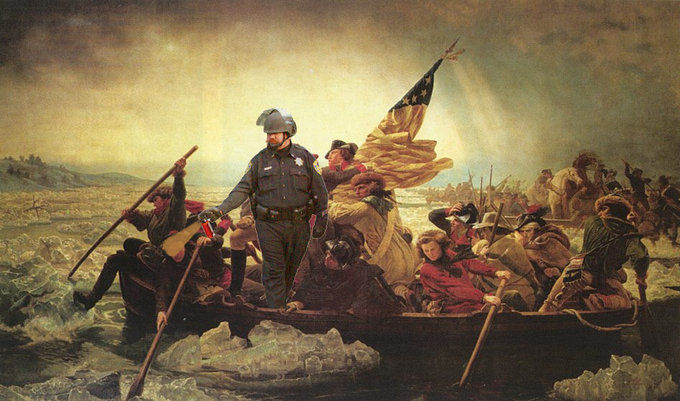
I saved the best for last. This one spoke volumes to me!
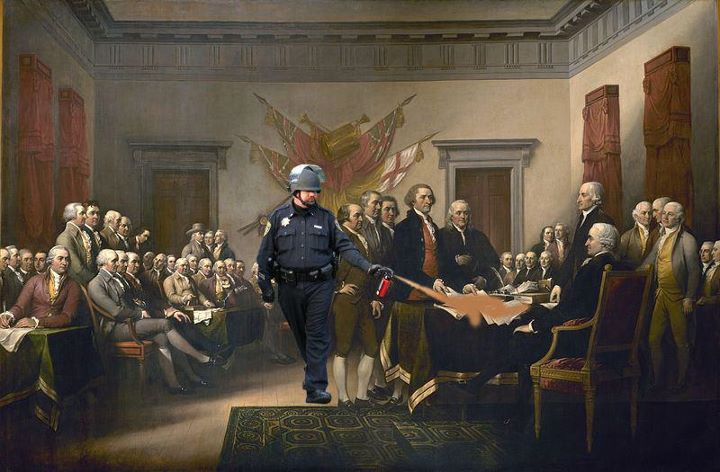
So the question I asked at the top of the thread was "Are we witnessing the rise of a new form of self regulating social control?" And I would say yes.
If you hadn't noticed before, kidding, or shunning is a form of social control. when we look at the etymology of kidding we get
So from this we see that kidding can be thought of as "Coaxing, to treat like a child, to make a kid of".
And by doing this, we hope to change upon or improve ones behavior, such as when we tease people into making a decision. With the birth of the internet culture, we are seeing this behavior on an almost global scale. Now if you get caught on tape acting in an inappropriate manner, the whole world can shun and kid you, as Lt. Pike is now finding out!
Know your meme: Pepper Spray Cop
In light of all the doom and gloom on ATS, I wanted to share this tidbit for a quick laugh and maybe witness the birth of a new trend.
Link-Uproxx
If you havent already read the story on this incident, there is a good existing thread if you are unfamiliar with this story.
Police Officer peppersprays nonviolent student protestors at UC Davis
As i stated in the title, this story has gone viral on the internet, resulting in an explosion of "lol-pics" or meme's.
The google trends on the keywords have gone through the roof, if you need proof!

here are some of the funniest ones I found.




I saved the best for last. This one spoke volumes to me!

So the question I asked at the top of the thread was "Are we witnessing the rise of a new form of self regulating social control?" And I would say yes.
If you hadn't noticed before, kidding, or shunning is a form of social control. when we look at the etymology of kidding we get
When the OED gives a fairly half-hearted sounding explanation of a word's origin, you know that no one really knows where the word came from. The verb to kid is one of those. It's likely that it came from the noun kid "the offspring of a goat". That dates in English from about 1200, and it is thought to be the same word as Old Norse kið (Swedish and Danish kid), which takes us back to the Old Teutonic root kiðjom "young goat". By 1599 the word's meaning had been extended in English to refer to human children (if you have ever seen young goats playing, you may understand why). How did we get from human children to joking? In 1811 to kid meant "to coax, hoax or humbug" in thieves' slang, and by 1839 it had softened a bit (and expanded from the circle of thieves) to mean "tease playfully, talk jokingly". It is thought to come from the "human child" meaning, with a notion of "to treat like a child", or from the sense "to make a kid (fool, ass) of"
So from this we see that kidding can be thought of as "Coaxing, to treat like a child, to make a kid of".
And by doing this, we hope to change upon or improve ones behavior, such as when we tease people into making a decision. With the birth of the internet culture, we are seeing this behavior on an almost global scale. Now if you get caught on tape acting in an inappropriate manner, the whole world can shun and kid you, as Lt. Pike is now finding out!
Know your meme: Pepper Spray Cop
edit on 11/21/2011 by VonDoomen because: (no reason given)
Remember this one?
Chinese faked photograph leaves officials on street of shame...
Mockery is a powerful tool, and the creativity of internet memes can definitely help a message spread. I think you're definitely on to something here.
Chinese faked photograph leaves officials on street of shame...
Mockery is a powerful tool, and the creativity of internet memes can definitely help a message spread. I think you're definitely on to something here.
HAHA, wow. This is great stuff. I still can't believe that guy. How dumb are these cops nowadays? To do something so ridiculous like that? This just
shows that the Police Departments are indeed looking for idiots to enlist in the police force. Now that I think about it, all the really bad kids I
grew up with.......all want to be cops now. Haha
Makes sense! Thanks for the post!
Makes sense! Thanks for the post!
LOLCops?
Awesome!
One thing I've noticed about all these protests that differs from anything I've ever seen before, is nearly everyone is armed with some kind of recording device. Every one of these videos I look at has literally dozens of citizens recording the whole thing.
This might be one of the things that saves us.
Awesome!
One thing I've noticed about all these protests that differs from anything I've ever seen before, is nearly everyone is armed with some kind of recording device. Every one of these videos I look at has literally dozens of citizens recording the whole thing.
This might be one of the things that saves us.
Is it a staged event to try and get other protestors to be as peaceful as possible? Psyop?
reply to post by magicrat
hey great addition to the thread! Thats certainly another example of how public opinion can be swayed through pics.
I wouldnt agree with attempting to make a legitimate photoshop of someone breaking the law in order to get them in trouble.
however the ones we see here, the jokes and shunning I would agree with. And I do believe we are seeing something new. Global shunning through the internet. I guarantee we will see more of this in the years to come!
hey great addition to the thread! Thats certainly another example of how public opinion can be swayed through pics.
I wouldnt agree with attempting to make a legitimate photoshop of someone breaking the law in order to get them in trouble.
however the ones we see here, the jokes and shunning I would agree with. And I do believe we are seeing something new. Global shunning through the internet. I guarantee we will see more of this in the years to come!
OP to your question... yes and no. This is nothing new, in and of itself, it is new in the fact that the general public can now participate in what
had been the private domain of the the well connected.
Technology has given the average person the ability to communicate thoughts, ideas and opinions with ease and effect.
The power to sway opinion no longer lies exclusively with those that control the mainstream media.
...as for the picture, I see a pudgy kid that lives in mom,s basement surrounded by "star wars" action figures playing dress up as an officer of the law. It is hard to be upset with the officer(?) for brutalizing these kids, as he was only trying to impress his buddies after all.(sarcasm)
The body language of this officer seemed to be that of someone "showing off" for his peers.
Meme for picture "WHO IS THE BIG MAN ON CAMPUS NOW ?"
Technology has given the average person the ability to communicate thoughts, ideas and opinions with ease and effect.
The power to sway opinion no longer lies exclusively with those that control the mainstream media.
...as for the picture, I see a pudgy kid that lives in mom,s basement surrounded by "star wars" action figures playing dress up as an officer of the law. It is hard to be upset with the officer(?) for brutalizing these kids, as he was only trying to impress his buddies after all.(sarcasm)
The body language of this officer seemed to be that of someone "showing off" for his peers.
Meme for picture "WHO IS THE BIG MAN ON CAMPUS NOW ?"
edit on 21-11-2011 by deepred because: add f to of to form off
reply to post by Backbiter
?
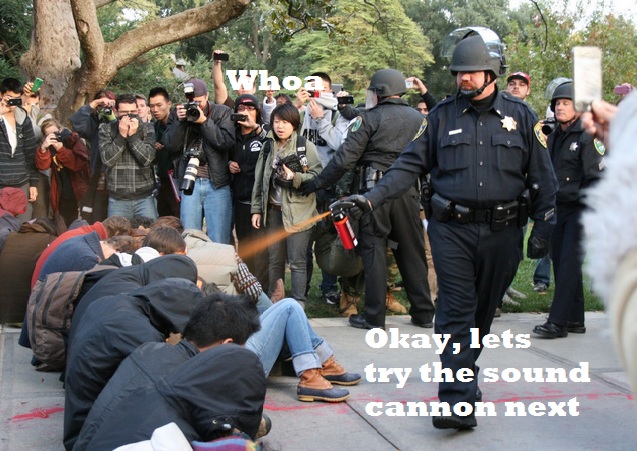
Lol these are really easy to make. I just wish memegenerator was offline at the moment.
?

Lol these are really easy to make. I just wish memegenerator was offline at the moment.
reply to post by VonDoomen
Happy to help - the use of Guernica really hits it out of the park for me - the context is absurd and perfectly accurate at the same time. And I
think you've hit on a meme to promote the memes: "Global shunning through the internet." I love it!
That's a good point - the basic idea isn't any different than what Jonathan Swift was doing with "A Modest Proposal" (first example off the top of my head). Satire has always been one of the strongest tools for social change, and truth can frequently best be seen through laughter.
The difference is that every single one of us now has the ability to be the court jester, and the satire can spread globally in an instant. This changes the game - probably in a more profound way than we know, or the elite expects.
Originally posted by deepred
This is nothing new, in and of itself, it is new in the fact that the general public can now participate in what had been the private domain of the the well connected.
That's a good point - the basic idea isn't any different than what Jonathan Swift was doing with "A Modest Proposal" (first example off the top of my head). Satire has always been one of the strongest tools for social change, and truth can frequently best be seen through laughter.
The difference is that every single one of us now has the ability to be the court jester, and the satire can spread globally in an instant. This changes the game - probably in a more profound way than we know, or the elite expects.
reply to post by tjack
I couldnt agree with you more!!
If you look at the very first picture, you can count 15 people that are recording this event, and thats only from that angle. But yes, every demostration ive seen so far seemed to have more people taping than actually protesting.
Imagine if digital recorders and the internet were this advanced back in the 60's!?
The future sure aint what it used to be!
I couldnt agree with you more!!
If you look at the very first picture, you can count 15 people that are recording this event, and thats only from that angle. But yes, every demostration ive seen so far seemed to have more people taping than actually protesting.
Imagine if digital recorders and the internet were this advanced back in the 60's!?
The future sure aint what it used to be!
edit on 11/21/2011 by VonDoomen because: (no reason given)
reply to post by magicrat
The whole global shunning really is something new!
I mean can you imagine the feeling of waking up and slowly realizing that the whole world seems to be singling you out for shunning via the internet and funny jokes? It has happened to very few people, but it has, and I bet they see the world as a whole new big place!
The whole global shunning really is something new!
I mean can you imagine the feeling of waking up and slowly realizing that the whole world seems to be singling you out for shunning via the internet and funny jokes? It has happened to very few people, but it has, and I bet they see the world as a whole new big place!
My personal favorite.

If you just Google image Lt. John Pike Memes, you will find SO many. I might be inspired to make one.

If you just Google image Lt. John Pike Memes, you will find SO many. I might be inspired to make one.
Originally posted by magicrat
reply to post by VonDoomen
Happy to help - the use of Guernica really hits it out of the park for me - the context is absurd and perfectly accurate at the same time. And I think you've hit on a meme to promote the memes: "Global shunning through the internet." I love it!
Originally posted by deepred
This is nothing new, in and of itself, it is new in the fact that the general public can now participate in what had been the private domain of the the well connected.
That's a good point - the basic idea isn't any different than what Jonathan Swift was doing with "A Modest Proposal" (first example off the top of my head). Satire has always been one of the strongest tools for social change, and truth can frequently best be seen through laughter.
The difference is that every single one of us now has the ability to be the court jester, and the satire can spread globally in an instant. This changes the game - probably in a more profound way than we know, or the elite expects.
If I were to become much too flowery, I might say... " the truth is bitter medicine, more easily digested when sweetened with humor"
edit on
21-11-2011 by deepred because: from "to" to "too"
Here's one, because people sitting down can be so unpredictable and dangerous:


reply to post by VonDoomen
My personal favorite...
(I don't know how to imbed sorry)
My personal favorite...
(I don't know how to imbed sorry)
edit on 21-11-2011 by ladykenzie because: (no reason given)
Know what I see?
I see one fat slob controlling a bunch of unich's. That idiot couldn't run 100 feet without having a heart attack and those "young men" all appear healthy enough to defend themselves, at least now the ridiculous "hoodie" fashion trend finally makes sense.
I hope that pisses you off.
I see one fat slob controlling a bunch of unich's. That idiot couldn't run 100 feet without having a heart attack and those "young men" all appear healthy enough to defend themselves, at least now the ridiculous "hoodie" fashion trend finally makes sense.
I hope that pisses you off.
new topics
-
How long till it starts
US Political Madness: 54 minutes ago -
USSS Agent Fired for Having Sex In Michelle Obama's Bathroom
US Political Madness: 2 hours ago -
Watching TV
Jokes, Puns, & Pranks: 5 hours ago
top topics
-
RFK is Trumps health pick
2024 Elections: 13 hours ago, 19 flags -
Watching TV
Jokes, Puns, & Pranks: 5 hours ago, 6 flags -
USSS Agent Fired for Having Sex In Michelle Obama's Bathroom
US Political Madness: 2 hours ago, 6 flags -
How long till it starts
US Political Madness: 54 minutes ago, 6 flags
active topics
-
USSS Agent Fired for Having Sex In Michelle Obama's Bathroom
US Political Madness • 15 • : hangedman13 -
The art of being offended
Social Issues and Civil Unrest • 40 • : Astrocometus -
RFK is Trumps health pick
2024 Elections • 9 • : nugget1 -
WATCH LIVE: US Congress hearing on UFOs, unidentified anomalous phenomena
Aliens and UFOs • 70 • : Lazy88 -
President-Elect DONALD TRUMP's 2nd-Term Administration Takes Shape.
Political Ideology • 194 • : matafuchs -
How long till it starts
US Political Madness • 1 • : stosh64 -
Alex Jones Reinstated on X
Education and Media • 88 • : NoCorruptionAllowed -
Speaker Johnson Orders Entire Biden Administration to Preserve and Retain All Records - Documents
US Political Madness • 70 • : xuenchen -
-@TH3WH17ERABB17- -Q- ---TIME TO SHOW THE WORLD--- -Part- --44--
Dissecting Disinformation • 3271 • : 777Vader -
Thanksgiving 2024
Member Art • 18 • : BingoMcGoof

